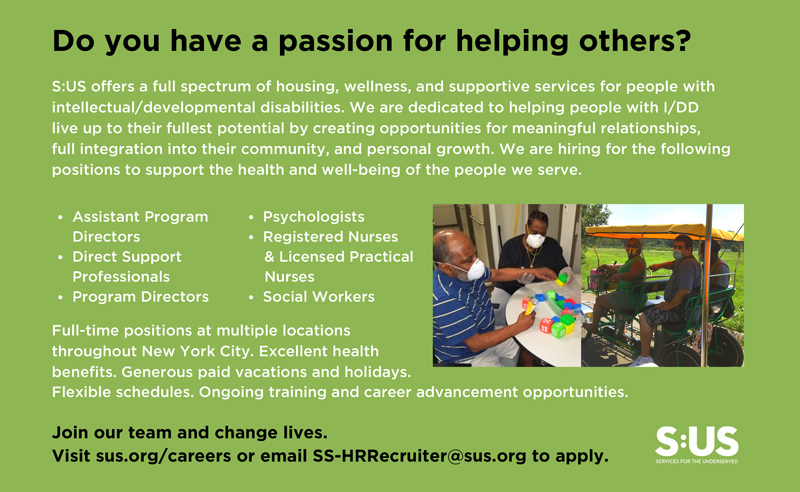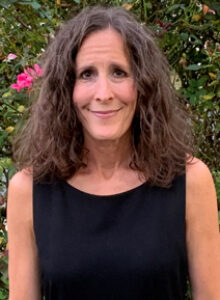As the Coordinator of Family and Wellness in the Developmental Disabilities Division at Services for the UnderServed (S:US) and a social worker with extensive experience in providing grief support, I am often requested to administer grief support to people with intellectual/developmental disabilities and our staff in various programs. When going out into the field to provide this type of support, I carry two quotes by seasoned, wise women as a reminder to nurture the qualities that are helpful to people in grief and mourning.

The first quote is from writer and poet Maya Angelou who wrote, “I’ve learned that people will forget what you said, people will forget what you did, but people will never forget how you made them feel.” In a culture and society that has historically shied-away from making space for grief and mourning, it is important to remind people to make space for their feelings and to help people feel their feelings, whatever they may be, in their time of grief.
The second quote is from French philosopher and political activist Simone Weil who wrote, “Attention is the rarest, purest form of generosity.”1 In providing grief support, it is beneficial to embody sensitivity, patience, an open heart to listen to what a griever needs to share, kind, generous attention, and a compassionate presence to tune into what one may need – even when it may be heavy or raw, especially when a life is cut too short.
In April, a vibrant, lively, and independent woman named Octavia, who was 26 years old and had an intellectual/developmental disability, traveled on a bus from her group home to her day habilitation program in the Bronx, NY, both managed by S:US, when she died due to a heart condition. Emergency medical technicians arrived at the scene, provided immediate medical attention, and took her to the hospital while a few of her housemates, peers, and staff witnessed her failing health. Soon after Octavia’s accident and subsequent death, the management team requested a grief support session for her friends and peers with intellectual/developmental disabilities along with staff at her day habilitation program.
During the grief support session, passages by researchers, writers, and doctors were shared to help them understand the context of their feelings and learn more about symptoms of grief. The emotional, physical, and behavioral responses of grief were shared, some of which included sadness, anger, guilt, anxiety, feeling lonely, helpless, shock or numbness; feeling a hollowness in one’s stomach, tightness in one’s chest or in one’s throat, a sensitivity to noise, breathlessness or muscle weakness; and experiencing changes in sleep, appetite disturbances, feeling absent-mindedness, social withdrawal, crying, sighing, and/or restless overactivity. The symptoms of grief were reviewed along with psychoeducational information to normalize what they may experience or what may arise for them as they mourn their good friend and peer.
In the article Forgotten Grief: Helping People with Developmental Disabilities Manage Personal Loss, Thomas Holmes writes: “…rather than trying to protect bereaved people with I/DD, counsellors and support staff should provide a supportive presence; offer concrete information; and advocate for the inclusion of the bereaved in decision making, rituals and mourning activities… A person-centered approach to assisting the bereaved has been shown to increase their understanding of their own grieving experience (Barbato & Irwin, 1992). Raskin and Rogers (2000) explain that the person-centered approach must be maintained on the principles of empathy, unconditional positive regard and congruence.”2
Empathy, empathic attunement, compassion, and a range of symptoms of grief were shared with the group to support them, to normalize their experiences, and promote self-understanding with the intention of decreasing any self-judgment. When one meets the bereaved with empathy, a compassionate presence and harmony, one can help the bereaved person give expression to their mourning and facilitate healing. Writer Lily Pinkus in her book Death and the Family: The Importance of Mourning shares, “From the moment life begins, human growth depends on accepting and mastering loss. The alternative to feeling loss in our gut is to risk irreversible damage to the life that remains.”3 Creating a safe space to share feelings helps in promoting an acceptance of loss. The importance of grief support cannot be underestimated and the support can take many forms – through talking, sharing stories or photographs and memories; creating art by drawing, painting, a group collage or mural, and music; sharing food, favorite recipes or cooking along with many other activities and rituals.4
The grief support session was provided to 17 people including all participants who attend this S:US day habilitation program plus management staff, Direct Support Professionals (DSPs), and the bus matron from the bus transportation company. Compassion was emphasized, along with patience and self-care practices to help them process their grief and begin to express their mourning. Shaida, a participant in the day hab, shared that the grief support session “…was really good for me, it helped me to be open to what I feel and how I may change (with grief). It got me through missing Octavia and made me a stronger person. The session made me think of all the good times I had with her – sharing lunches, going out with her, swimming and visiting the water park. I feel angry that it happened. It’s taking a long time but I’m getting there…she was like a sister to me. I really appreciated it (the session). It got me through some tough times. It helped me think of what Octavia would want us to do – be happy, continue living my life, and think of the good times I had with her. I just keep going forward.”
Daymont, another participant from the same program shared, “I felt shock… the session was helpful. I am still missing her. It’s okay to feel your feelings, make space for them.”
For Stephanie, a DSP, the session was beneficial for her and for her work with the people that she supports. Stephanie views her mourning through the lens of “…acceptance and connecting with others. I learned to be patient with myself and others in the healing process. I continue to reminisce about Octavia, to talk about our good memories and experiences that we had with her, and encourage the people we support to share them along with their feelings when they come up.” Making space for memories and feelings are essential in encouraging healing when a loved one dies.
In the book Healing Your Grieving Heart: 100 Practical Ideas, Alan D. Wolfelt, Ph.D. writes: “The journey through grief is a long and difficult one. It is also a journey for which there is no preparation. Be compassionate with yourself as you encounter painful thoughts and feelings of loss and grief. Don’t judge yourself or try to set a particular course for healing. Let your journey be what it is. And let yourself – your new, grieving self – be who you are.”5
Dr. Wolfelt encourages pausing, slowing down, making space for whatever feelings arise and honoring one’s needs when one is in mourning. Justin, another friend of Octavia and program participant concurred when he shared, “Yes, the session was helpful, it was good that you made space for our feelings.” Mary, a close friend of Octavia and another program participant, shared that the support was “…very helpful because I was a little heartbroken because we lost Octavia and I was close with her… I still can’t get over it. I expect her to come running to me when I come to the day hab. I really miss her, I will never forget her and I have good memories of her. The support helped us gather around together, grieve together as friends and as a family to support each other. Holidays will be totally different without her.”
In The New York Times, writer and psychotherapist Patrick O’Malley wrote, “The truth is that grief is as unique as a fingerprint, conforms to no timetable or societal expectation.”6 There is no reward for speed when one grieves. It is essential to make space for whatever feelings come up, seek out compassionate, kind people, and be kind and gentle to oneself in one’s journey of mourning. It is a journey to be honored and respected, along with one’s unique experience in mourning, and reflective of the relationship that one had with the loved one who passed away.
The grief support session was valuable as it informed people that they can be compassionate and respectful towards their mourning. And as it pertains to their needs, they can share their feelings about Octavia as they come up, reminisce about the good experiences they had with her, and help each other during the difficult times as they continue to remember her and heal.
Lori Lerner, LMSW, RYT-200 hr., is Coordinator of Family and Wellness at Services for the UnderServed (S:US). Ms. Lerner may be contacted by email at llerner@sus.org or by phone at (917)408-5366.
References
- “How Not to Be Alone” by Jonathon Safran Foer, The New York Times, June 8, 2013.
- “Forgotten Grief: Helping People with Developmental Disabilities Manage Personal Loss” by Thomas Holmes, The Alberta Counsellor, Volume 32, Number 1, Winter 2012.
- “Death and the Family: The Importance of Mourning” by Lily Pinkus, Faber, London, UK, 1976.
- “Forgotten Grief: Helping People with Developmental Disabilities Manage Personal Loss” by Thomas Holmes, The Alberta Counsellor, Volume 32, Number 1, Winter 2012.
- “Healing Your Grieving Heart: 100 Practical Ideas” by Alan D. Wolfelt, Ph.D., Companion Press: The Center for Loss and Life Transition, Fort Collins, CO, 2001.
- “Getting Grief Right” by Patrick O’Malley, The New York Times, January 10, 2015.






